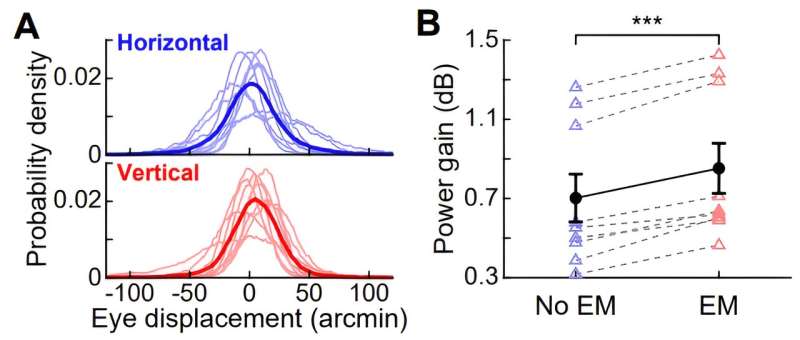April 15, 2024 report
This article has been reviewed according to Science X's editorial process and policies. Editors have highlighted the following attributes while ensuring the content's credibility:
fact-checked
peer-reviewed publication
trusted source
proofread
Blinking found to do more than simply wet the eyes—it helps boost visual signal strength

A trio of brain and cognitive scientists at the University of Rochester, in the U.S., has found that eye blinking does more than simply wet the eyes—it also helps to keep vision sharp by maintaining the strength of visual signals.
In their study, published in Proceedings of the National Academy of Sciences, Bin Yang, Janis Intoy and Michele Rucci, studied eye blinking in a group of young adults.
Prior research and anecdotal evidence suggest that blinking occurs as a means to keep the surface of the eyes moist and to remove dust or other matter. Some studies have shown that blinking also helps the brain remain concentrated on whatever a person is looking at, recognizing objects and helping to process the constant stream of visual information into manageable chunks.
But it has also been noted that visual information is periodically lost as the eyes blink. One study also found that neural activity related to vision processing slows when the eyes begin to blink and then comes back afterward, giving the neural system a short break—perhaps preventing overstimulation.
In this new study, the researchers suspected that blinking might also serve another purpose—to maintain visual acuity. To find out if that is the case, they asked 12 young adults to participate in a vision study.
The researchers used a high-resolution eye-tracking device to study characteristics of the eye while the volunteers looked at images of varying contrast. The research team found that each blink served to increase the visual input signal strength by modulating the intensity of the light striking the retina.
The researchers found that the boost occurred during both involuntary and voluntary blinks. They also found evidence that blinking helps to reformat the visual information that is sent to the brain.
The researchers suggest that blinking more than makes up for the momentary losses in vision by boosting signal strength, helping to maintain acuity, and assisting the brain in processing a constant stream of visual information.
More information: Bin Yang et al, Eye blinks as a visual processing stage, Proceedings of the National Academy of Sciences (2024). DOI: 10.1073/pnas.2310291121
© 2024 Science X Network





















